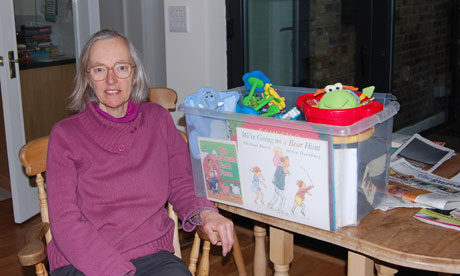Family Link giving family carers a much needed break
A day in the life of … a volunteer respite carer
To mark Share the Care week, Margaret Pedler wants to encourage others to sign up to help families with severely disabled children
-
Margaret Pedler
- Guardian Professional,

My husband Andy and I have been part of Southwark council’s Family Link programme for two years; we spend one day a month looking after a little girl with complex physical needs.
I wanted to find a way to put my spare time to good use and work with children, but couldn’t sign up to the full-time commitment of fostering. Instead I saw an advert for Family Link, which trains local volunteers to help a family stay together by offering respite care.
Looking after a disabled child is a full time, 24-hour-a-day role and can only be sustainable if parents can get respite, while knowing someone is there to allow them some time for themselves or their other children.
The application process was very comprehensive and took some time. Southwark council takes great care in gauging your ability to take on such a responsible role. People who are parents might have some experience but we don’t have children, so it’s not a pre-requisite.
We usually take care of our little girl on a Sunday every few weeks or so. The Family Link model is based on overnight stays or even full weekends, but most carers will build up to that and Southwark council also offers a day service so it really depends on the needs of the child, their family and what the carer can offer.
The day starts with getting her toy box and setting up her Switch, a device she uses to play on the computer. She usually arrives by about 11am and we have a gentle start to the day, usually by playing counting games like Five Little Ducks on the computer.
Lunch is early, around noon or 12.30pm. Part of the process of becoming a Family Link carer is meeting and talking to the child’s family about their routine, likes and dislikes etc. Southwark council matched us in a similar way they do foster parents or adopters and we got full training on how to care for a disabled child, but the personal stuff comes down to communication.
We spoke to the council at length about the children they have on their books and what might suit us best before we were introduced to the family and got to know them, and them us, through visits and spending time together. One of the things we spoke about was the number of children and families who were looking for Family Link carers. In Southwark, they need to recruit around 40 new carers to meet the demand.
In the afternoon, if the weather permits, we like to go out. Our park has a swing that can be adapted for a wheelchair and she loves to be around other children and play. She also likes seeing the fish at the nearby Horniman Museum. Generally we make the most of what’s on in our local area. Other times we stay in and read stories or listen to music.
When her mother comes to collect her in the evening we fill her in on what’s been going on. We keep a diary so we have a written record of what happened like if she ate all her lunch or not, and sometimes we share photos of what we’ve been up to. Her mother will also tell us how she spent her day, maybe taking her other daughter to the cinema to spend some quality time with her. It’s hearing this that really makes me enjoy being part of Family Link. I feel valued and appreciated by the family and I get a lot out of it.
When they’ve gone, Andy and I tidy up and chat about the day, what went well and what we could try next time. We are building our relationship with the family and I’m hopeful we will be able to progress and maybe offer some overnight stays.
It’s been a wonderful experience so far and I would recommend it to anyone thinking of offering their time.
http://www.guardian.co.uk/social-care-network/2013/mar/22/day-life-volunteer-respite-carer






